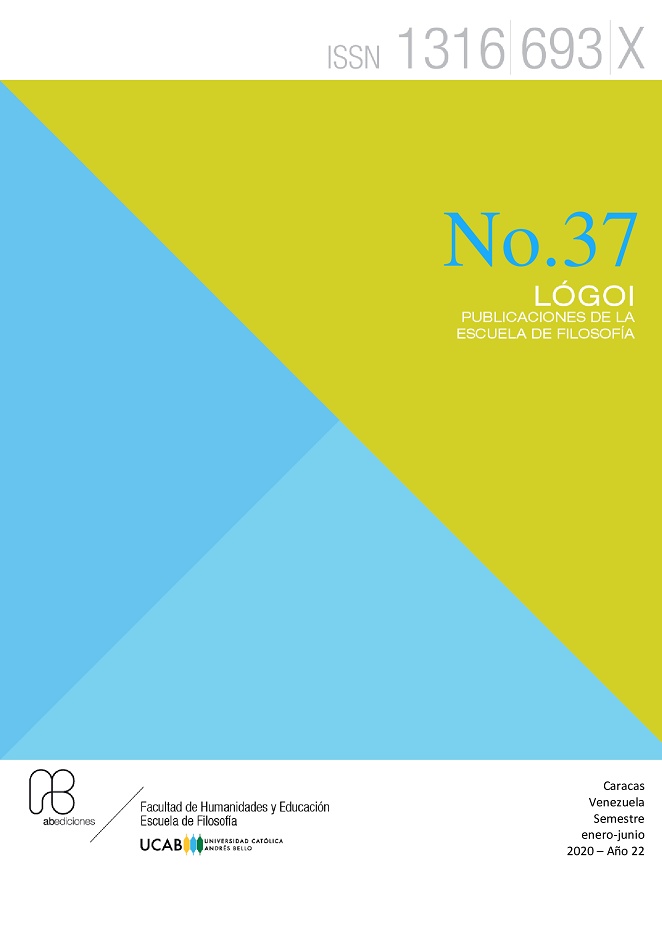Núm. 37 (2020): Núm. 37 (2020) enero-junio 2020. Lógoi. Revista de Filosofía



This work is licensed under a Creative Commons Attribution-NonCommercial-ShareAlike 4.0 International License.
LÓGOI Revista de Filosofía se edita bajo los auspicios de la Universidad Católica Andrés Bello. Apartado Postal 20332. Caracas 1020-A, Urb. Montalbán. La Vega. Facultad de Humanidades y Educación. Escuela de Filosofía Teléfonos: 0212 4074238 – 4074237. www.ucab.edu.ve
Depósito Legal: pp. 199802df38 (Impreso) ISSN: 1316-693X (Impreso)
Deposito Legal: DC2021000745 (En línea) ISSN: 2790-5144 (En Línea)
ISSN- L: 1316-693X
Lógoi, Revista de Filosofía es arbitrada bajo la modalidad doble ciego e indizada en: REVENCYT: RVL006, CLASE, BIBLAT, The Philosopher’s Index, DIALNET, Ulrich’s Periodicals Directory, Directorio de LATINDEX, Base de datos EBSCO, Road, MIAR, LATINREV, REBID, ERIH PLUS, DOAJ, BASE
Lógoi, Revista de Filosofía mantiene una periodicidad semestral dos fásciculos al año. enero-junio y julio-diciembre.
Director José Luis Da Silva
Colaboraciónes enviar al siguiente correo: logoirevistadefilosofía@gmail.com
Los artículos publicados en LÓGOI Revista de Filosofía están sujetos a una licencia Creative CommonsCC BY-NC-SA y pueden ser reproducidos para cualquier uso no comercial, con el respectivo uso no comercial con el respectivo reconocimiento al autor.
CONSEJO EDITORIAL: Jesús Hernáez, Instituto de Teología para Religiosos; Lorena Rojas, Universidad Católica Andrés Bello. Mariano Nava, Universidad de los Andes, Venezuela. María Guadalupe Llanes Universidad Central de Venezuela; Rodrigo Esparza Tecnológico de Monterrey, Campus Puebla. Fabiola Vethencourt (Universidad Central de Venezuela)
CONSEJO DE REDACCIÓN: Lizette Nava, Universidad Católica Andrés Bello; José Luis Da Silva Universidad Católica Andrés Bello; Jesús Hernaéz, Instituto de Teología para Religiosos. Venezuela
CONSEJO DE ESTILO E IDIOMA: José Piedra (traductor y redactor de los resúmenes en idioma francés) (Instituto Pegagógico de Maturín), Ricardo Tavares (traductor y redactor de los resúmenes en idioma portugués) (Coordinador del programa de de Estudios Avanzados en Gerencia Editorial de la Universidad Católica Andrés Bello, editor de Abediciones, Universidad Católica Andrés Bello. Valeska Villarroel, Liz Rengel y Karen Rodriguez . (traductoras y redactoras de los resúmenes en idioma inglés - francés (Centro para el desarrollo de LEnguas Extranjeras. Universidad Católica Andrés Bello. Venezuela.
ADMINISTRADOR DEL SISTEMA: Luis Caceres. Centro Cultural Biblioteca Central Universidad Católica Andrés Bello. Venezuela, República Bolivariana de Venezuela
ASISTENTES DE SECCIONES: Stefania Piccoli / Angybel Abdel. Universidad Católica Andrés Bello, Venezuela, República Bolivariana de Venezuela
Correos electrónicos para el envío de colaboraciones: logoirevistadefilosofía@gmail.com - jdasilva@ucab.edu.ve
Los artículos publicados en LÓGOI Revista de Filosofía se encuentran sujetos a una licencia Creative CommonsCC BY-NC-SA y pueden ser reproducidos para cualquier uso no-comercial otorgando el reconocimiento respectivo al autor.